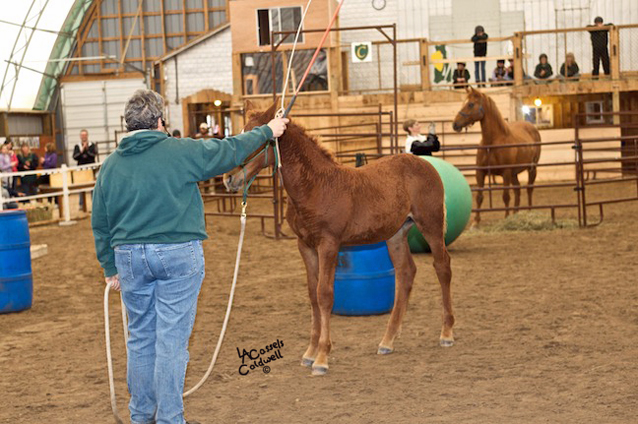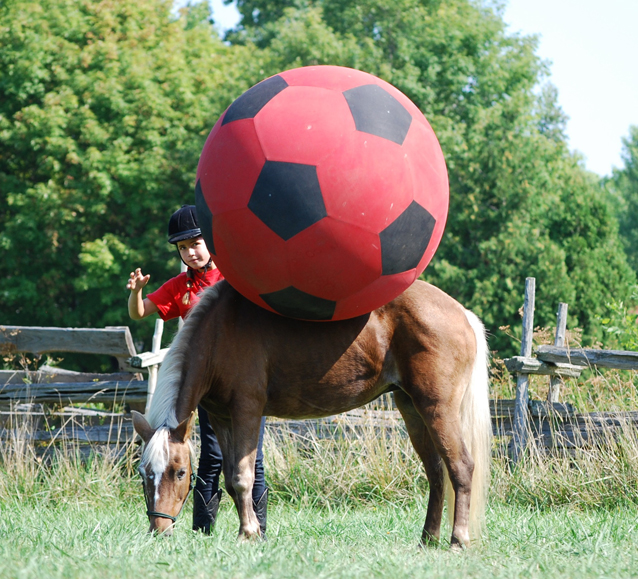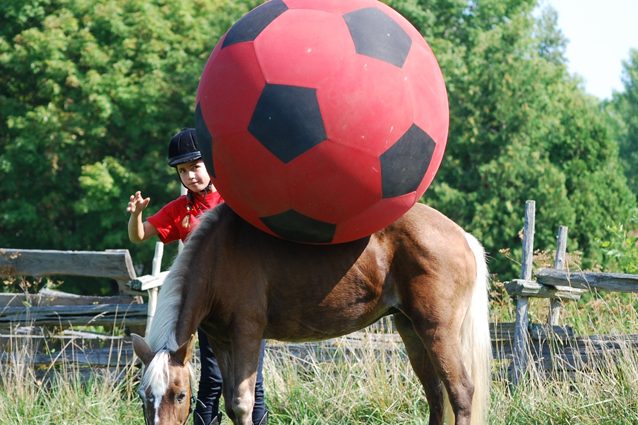
CFN – This Column of “Spirits in Unity” is being published by CFN for the community of Stormont, Dundas & Glengarry.
Thanks to all those who have approached me to say that they enjoy reading this column. Knowing that someone is reading the column encourages me to keep writing about my learning experience with horsemanship.
Strategies for Improving Emotional Fitness
Misunderstanding and miscommunication are one of the biggest factors contributing to fear and confusion in horses. Maybe humans too. With humans fear comes from a lot of sources, sometimes from things were are not even aware of. The best thing to overcome fear is love.
There are those gifted horsemen who have an uncanny understanding of the ways of horses but for most of us it is hard work and study. Contrary to what many traditional horsemen will tell you though, you can learn to be effective around horses. You don’t need some magical gene to accomplish remarkable things with horses. Many traditional trainers try to give the impression that there is some mystical gift that you need to become a good horseman and that you have little hope of achieving this without their constant help. This may be a good business model in that it keeps you tied to your teacher’s apron strings for the rest of your life. Indeed, I know of many people with horses that have never used their horses without their coach present. This is not emotional fitness. It shows lack of knowledge on the part of the student. It is the main job of any teacher to impart the knowledge and skills so that their students can enjoy their horses in safety, with confidence and independence.
It’s Learnable
By mastering the basic principles (foundation) of horsemanship you learn better how to be a master communicator with horses based on love, communication and leadership.
Communication is one of the keys to emotional fitness. As I study the methods of the best horse masters, there is one common thread that continually appears. Each horseman may call them by different names, but they all have a set of basic manoeuvres that they teach their horses. These manoeuvres form a balance between principles and purpose and are based on the play that horses use to practice survival skills, and to establish friendship and dominance.
Playing games the way horses play with each other helps to reduce your horse’s confusion, improve communication between you and your horse and as a result, reduce the elements that cause his to fear. By progressively improving the sensitivity of your horse to your requests, it will begin to take less to get more.
The first category of games is the confidence game and is probably the most important one in achieving a trust-bond relationship with your horse. The key to improving confidence is to use approach and retreat. Teach your horse not to be afraid of swinging ropes, umbrellas, tarps, audiences clapping, humans on top of him, cracking whips and many more. If you use these things as part of a regular ongoing program rather than as a method to desensitize him or achieve a single outcome, your horse’s overall emotional fitness will begin to improve.

Rhythm
Whenever you try to build confidence remember three things: Rhythm, Relaxation, Approach and Retreat. Rhythm helps the horse to recognize that things are predictable and acceptable. If you think about it, fear of horses by humans comes mainly from the unpredictability of his actions. When you or your horse are better able to predict the outcome, they have no reason to be worried.
Relaxation
Because of a horse’s keen ability to read your emotional state you need to be relaxed in your body and your attitude. If you are tense, anxious or frustrated you will not be seen as friendly by your horse. If you can’t relax, it may even be better just to put off your training session to another time.
Approach and Retreat
Whenever you approach a horse, be aware at what point it begins to bother him. Immediately retreat to reduce the onset of fear and re-approach when you until the horse is no longer tense and allows you closer. Look for when the horse is giving you permission which comes when he shows relaxation – exhales, lowers his head, blinks his eyes, licks his lips or cocks a leg. To keep approaching before he relaxes may result in desensitization but it will come at the expense of causing a lot of stress to the horse.
Many people confuse standing still as meaning that their horse is relaxed. It is important that he is not just frozen to the spot in fear and then suddenly surprise you with an outburst. This can happen often with introverted horses. Make sure he is breathing regularly, his head is level with his withers (not on the ground) and his muscles are not tense.
Developing confidence in your horse should always be accomplished before any real training begins. Depending on your level of skill or how timid or damaged your horse is, these confidence building tasks could take anywhere from minutes to months to achieve. Remember it is not a race.
An Example of Confidence Building
Several years ago a good friend of ours and local breeder brought her young foal to a show at our facility. There was a large crowd and it was the foals first time in front of an audience. When the crowd applauded, the foal immediately bolted. His handler, calmed him and then spoke to the audience. She asked them to applaud when she held up her training stick as a signal to begin and to immediately stop when she lowered the stick.
When the audience applauded, the foal began to move and was allowed to do so until he stopped moving. Immediately the handler lowered the training stick and both her and the foal stood quietly together. After she had observed that he had regained his composure, she raised the stick again and again the foal bolted, but this time not a vigorously and he stopped sooner. After 3 or 4 tries the foal was no longer bothered by the audience clapping and remained calm. This shows that approach and retreat does not have to be a physical distance but can also involve the removal of the offending threat.
Now it is important to remember that horses will lose confidence more easily than they gain it. So don’t make assumptions that once you have improved his confidence with a particular object etc. that you’re set for life. Confidence games should be used on a regular basis with horses if for no other reason than to just test the waters’ as it were.
When you begin a program of confidence building, do it seven times in a row, then every second time, then every third time, then every once in a while and especially if you know you are going into any kind of potentially challenging situation. Horse masters are constantly preparing their horse.
Next time I will discuss more keys to improving emotional fitness.
Whether you are just a horse lover, have dreams of owning a horse someday, or already have one, I hope these columns will give you some insight into the true nature of these magnificent creatures. I hope you will find them both informative and inspirational.
Be part of your horse’s dreams, not his nightmares.
May all your dreams come true,
Garry “Horsetalker” Meek


Excellent Garry- thank you for the review of how build up a horse’s confidence, I was there when Guinness was the foal in the story-he was such a character! It’s always a pleasure to read your column. Wishing you and yours a very happy Holiday season.
Hi Gay
As usual an excellent and very useful,article!
I Liked the story about the foal.
My original coach use to use geese for the same thing 🙂